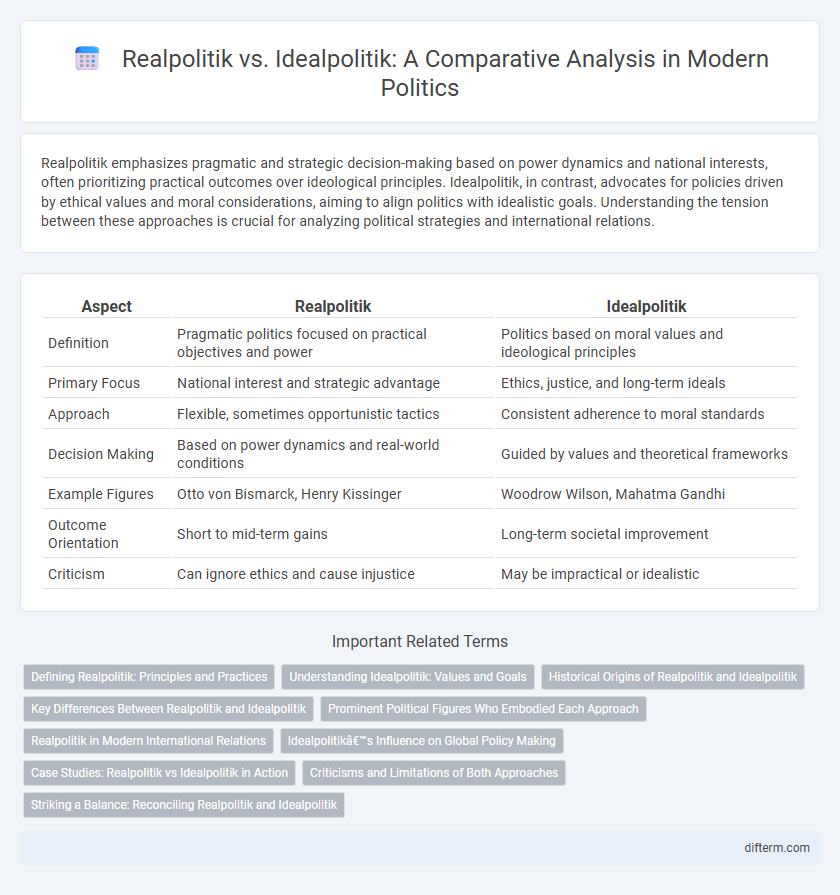Realpolitik emphasizes pragmatic and strategic decision-making based on power dynamics and national interests, often prioritizing practical outcomes over ideological principles. Idealpolitik, in contrast, advocates for policies driven by ethical values and moral considerations, aiming to align politics with idealistic goals. Understanding the tension between these approaches is crucial for analyzing political strategies and international relations.
Table of Comparison
| Aspect | Realpolitik | Idealpolitik |
|---|---|---|
| Definition | Pragmatic politics focused on practical objectives and power | Politics based on moral values and ideological principles |
| Primary Focus | National interest and strategic advantage | Ethics, justice, and long-term ideals |
| Approach | Flexible, sometimes opportunistic tactics | Consistent adherence to moral standards |
| Decision Making | Based on power dynamics and real-world conditions | Guided by values and theoretical frameworks |
| Example Figures | Otto von Bismarck, Henry Kissinger | Woodrow Wilson, Mahatma Gandhi |
| Outcome Orientation | Short to mid-term gains | Long-term societal improvement |
| Criticism | Can ignore ethics and cause injustice | May be impractical or idealistic |
Defining Realpolitik: Principles and Practices
Realpolitik emphasizes pragmatic, strategic decision-making centered on power and national interests rather than ideological or ethical considerations. It prioritizes realistic assessments of political landscapes, often involving compromise and tactical flexibility to achieve concrete goals. This approach contrasts with idealpolitik, which is driven by moral values and visionary principles in policy-making.
Understanding Idealpolitik: Values and Goals
Idealpolitik emphasizes policymaking driven by ethical principles and long-term visions for justice, human rights, and equality. It prioritizes moral values and ideological consistency over immediate pragmatic gains, aiming to create a just society rooted in idealistic goals. Unlike realpolitik's focus on power and practical outcomes, Idealpolitik seeks transformative change guided by universal ideals and normative standards.
Historical Origins of Realpolitik and Idealpolitik
Realpolitik emerged in 19th-century Europe, notably associated with Otto von Bismarck, emphasizing pragmatic and strategic considerations over moral or ideological principles in statecraft. Idealpolitik, rooted in Enlightenment values, advocates for foreign policies driven by ethical standards, human rights, and international law, reflecting the visions of thinkers like Immanuel Kant. The contrasting historical origins highlight Realpolitik's foundation in power dynamics and practical governance versus Idealpolitik's pursuit of principled diplomacy and global justice.
Key Differences Between Realpolitik and Idealpolitik
Realpolitik prioritizes pragmatic and strategic decision-making based on power dynamics, national interests, and practical outcomes, often overlooking ethical considerations. Idealpolitik emphasizes moral principles, values, and long-term ideological goals, striving to align political actions with ethical standards and visionary objectives. The key difference lies in Realpolitik's focus on realism and adaptability versus Idealpolitik's commitment to ideals and normative frameworks.
Prominent Political Figures Who Embodied Each Approach
Otto von Bismarck exemplified Realpolitik through his pragmatic, power-focused diplomacy that unified Germany by prioritizing state interests over ideology. In contrast, Woodrow Wilson championed Idealpolitik, advocating for international cooperation and moral principles, notably through his Fourteen Points and the League of Nations proposal. These leaders' contrasting strategies highlight the enduring tension between pragmatic statecraft and idealistic political visions in global politics.
Realpolitik in Modern International Relations
Realpolitik in modern international relations emphasizes pragmatic and strategic decision-making based on national interests, power balances, and practical considerations, often sidelining ideological or ethical concerns. This approach drives state behavior through calculated diplomacy, alliance-building, and sometimes coercive tactics to maintain stability and advance influence amid global complexities. Its prevalence is evident in contemporary policies where security, economic gains, and geopolitical dominance take precedence over idealistic goals.
Idealpolitik’s Influence on Global Policy Making
Idealpolitik significantly shapes global policy making by emphasizing ethical principles and human rights alongside national interests, promoting cooperative international relations. This approach encourages governments to adopt sustainable development goals, climate change agreements, and global humanitarian efforts as central policy priorities. Idealpolitik's influence fosters multilateral diplomacy and the creation of institutions like the United Nations, which advance collective security and global governance frameworks.
Case Studies: Realpolitik vs Idealpolitik in Action
Realpolitik emphasizes pragmatic, power-centered decision-making as seen in Otto von Bismarck's unification of Germany, where practical alliances and military strategy prevailed over ideological goals. Idealpolitik prioritizes moral principles and long-term visions, exemplified by Woodrow Wilson's advocacy for the League of Nations and collective security to promote global peace. These case studies highlight the tension between strategic realism and ethical idealism in shaping foreign policy outcomes.
Criticisms and Limitations of Both Approaches
Realpolitik faces criticism for prioritizing power and practical interests over ethical considerations, often leading to ruthless decision-making and erosion of moral values in politics. Idealpolitik, while emphasizing moral principles and ethical standards, is frequently criticized for being overly idealistic and impractical, sometimes ignoring power dynamics and geopolitical realities. Both approaches have limitations, as Realpolitik can foster cynicism and instability, whereas Idealpolitik risks ineffectiveness in achieving tangible political outcomes.
Striking a Balance: Reconciling Realpolitik and Idealpolitik
Striking a balance between Realpolitik and Idealpolitik requires integrating pragmatic power-based strategies with visionary ethical goals to achieve sustainable political outcomes. Effective governance often depends on navigating the tension between hard-nosed diplomacy and principled policymaking to maintain national interests while upholding moral values. This reconciliation fosters diplomatic flexibility without sacrificing long-term ideals, enabling adaptive yet ethically grounded statecraft.
realpolitik vs idealpolitik Infographic

 difterm.com
difterm.com